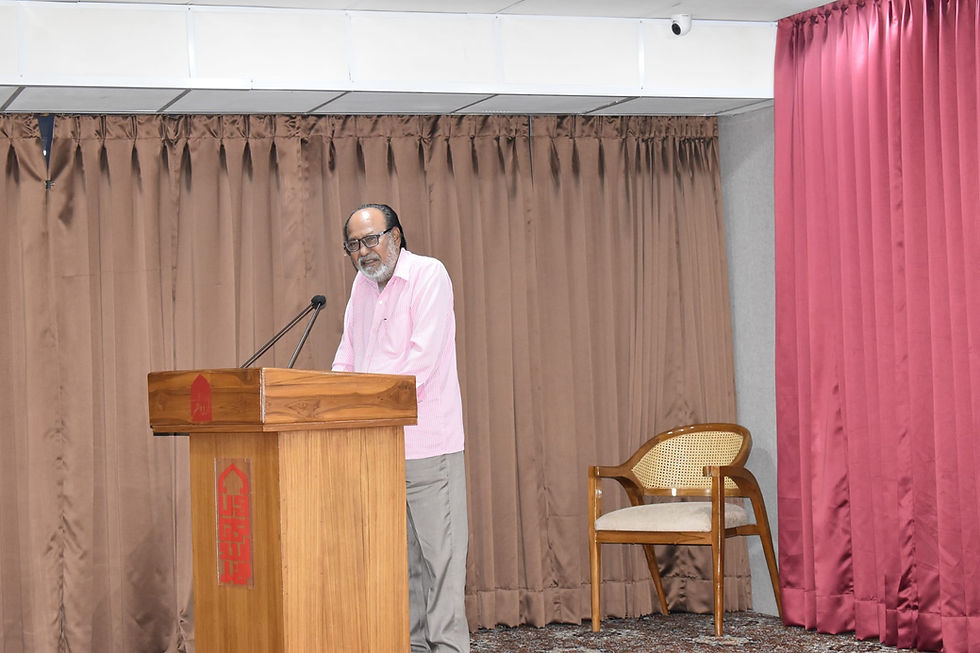Laulak: What If You were not There?
- Aslam Abdullah
- Aug 22, 2025
- 4 min read
Updated: Aug 23, 2025

Dillu Ram Kausari, a renowned Hindu poet from British India, wrote over 40 naats (eulogies) dedicated to the Prophet Muhammad, which were compiled into the anthology Hindu Ki Naat in 1924. His work reflected a profound personal devotion, emphasizing that love for the Prophet transcends religious labels. One couplet reads: "Being a Muslim is no condition for loving.
During times of communal tension in 20th-century India, non-Muslim Urdu poets such as Jagan Nath Azad, Dillu Ram, and Hari Chand wrote poems celebrating the Prophet's virtues, compassion, and justice, showing his broad spiritual and social influence.
While "Laulak" is not a Hindi word, it is a poem, typically referred to as the Hadith-e-Laulak, that is part of the Islamic tradition. It is often cited in Urdu and Persian poetry, and its meaning is central to the concept of the Prophet Muhammad's significance in creation.
The name Laulak comes from a hadith used to illustrate the Prophet Muhammad's importance to the universe.
The text: The phrase "Lau laaka, lamaa khalaqtu al-aflaak" translates to "If not for you, I would not have created the celestial spheres".
This saying, attributed to Allah, suggests the universe was created for the Prophet Muhammad. It elevates his status as the reason for creation.
While accepted by many Islamic scholars, some consider the exact wording of this hadith to be fabricated (mauzoo). However, it is still widely used in Sufi and mystical poetry. It is essential to differentiate between the hadith and the book by Chandrabhan Khayal. His Urdu work is a poetic tribute to the Prophet Muhammad.
The work is a collection of poetry dedicated to the Prophet, known in Urdu as na'at.
It explores love and reverence for the Prophet, using the central idea of the Hadith-e-Laulak to highlight his spiritual importance.
Khayal, like other poets, uses the concept of the Prophet as the purpose of creation to express respect and love for the spiritual and moral example of Muhammad.
Khayal was born to Kunjilal Bhagoria and Ajudhdhi Bai on April 30, 1946, in Babai (now Makhan Nagar), Madhya Pradesh. Bhagoria refers to a festival and dance tradition primarily celebrated by the Bhil tribal community in Madhya Pradesh, India, and not to a caste. Other tribes in the region, such as the Bhilalas, Patelia, Rathwa, and Barela, also participate in the Bhagoria Haat festival.He completed his graduation from Sagar University, Madhya Pradesh.Khayal began his professional journey as a special correspondent for the Urdu daily Qaumi Awaz, serving from 1981 until his retirement in 2006. From February 2008 to June 2011, he was appointed Vice-Chairman of the National Council for Promotion of Urdu Language (NCPUL), the premier government institution for Urdu under the Ministry of Human Resource Development, Government of India.
He has also served twice as a member of the Delhi Urdu Academy and held positions as Convener and Executive Member of the Urdu Advisory Board of the Sahitya Akademi.Khayal’s poetry collection Sholon Ka Shajar, published in 1979, brought him significant attention from senior Urdu writers and critics. Over the years, he published several more poetry collections, establishing himself as a prominent literary voice.
His 2002 poem "Laulak," which celebrates the life of the Prophet Muhammad, has been incorporated into school curricula in Kuwait and Saudi Arabia.
Chanderbhan Khayal, a well-known name in the annals of Urdu literature, a Shatihya Akademy awardee, and author of 13 books, is the only person in the world to have penned a ballad in honor of the founder of Islam, Prophet Muhammad. The Book, Laulak, comprises 400 couplets on 100 pages and has won him accolades and awards worldwide.
At the age of eight, he read an essay about the Prophet, and it left a deep impression on his young mind. He kept thinking and visualizing the powerful personality of the Prophet. He marveled at how, some 1500 years ago, one person at the age of 23 had brought about radical changes in the Arab world. Furthermore, he created a society where everyone was to be treated as equal; there was no injustice and no cumbersome religious ceremonies and rituals.”
Throughout his formative years, he continually thought about this powerful personality, which captivated his mind. However, for the rest of his life as a student and later a literary figure, Chanderbhan continued to explore the life of Prophet Muhammad. He gathered as many details as he could about the Life of the Prophet. He worked on the idea for 13 years, and his book Laulak (If You Were Not There) was finally published in 2002.
His book in Urdu was a roaring success, as it has gone for a second edition in Urdu and has been translated into Hindi and many other languages.
The book Laulak earned him accolades from all over the Islamic world. He has fond memories of the occasion when the Iranian government invited him to a poetic symposium on the Prophet Muhammad.
He was among 150 poets from different global languages at the Symposium in Mashhad in 2004. As he recited my poem in Urdu, it was being simultaneously translated into Persian. He received a thunderous standing ovation from the audience for five minutes; everyone stood to their feet to greet him. The governor of the province walked up to me and shook my hand; the Imam of the city blessed him.



Comments